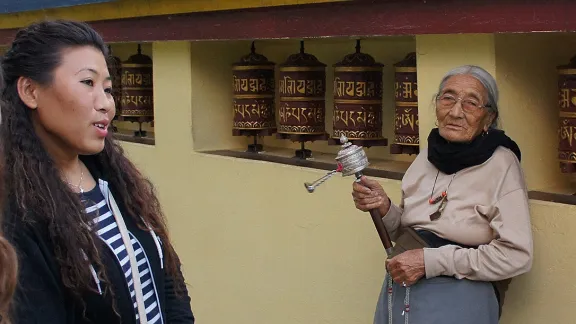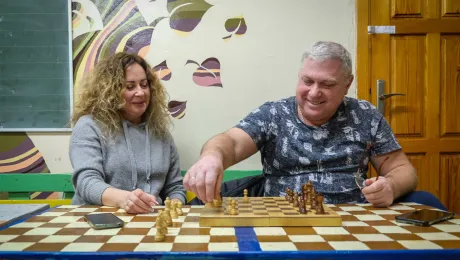
Kandho (center) and Sonam (left) in the Tishaling Tibetan Settlement, Pokhara. Photo: LWF/ C. Kästner
« Om mani padmi om »… The old woman mumbles while touching the prayer wheels outside the stupa- or gomba- in the Tishaling Tibetan Settlement near Pokhara. After spending the better part of the day driving from Kathmandu to Pokhara, we visit one of the four settlements for Tibetan refugees in the city.
It is an obvious change to what we saw before. Instead of pujas in front of the houses entrance, we are now surrounded by garlands of colorful prayer flags. There are four Tibetan refugee settlements in Pokhara. Tishaling is a small village, home to 120 households with 740 Tibetans up to the third generation.
Khando, the old woman we meet at the stupa, like many elderly women does her rounds every day. 40 times she circles the stupa in the morning, 20 times in the evening, to pray for the Dalai Lama, for happiness and peace in the world and for her own wishes – in that order. She came to Nepal in 1964 as a 18-year-old girl. In Tibet, her family were nomads, they used to herd goats and yaks in the Tibetan highlands. “Of couse I want to go back” she says. “I miss my country, the place where I lived”. Now her brothers and sisters live in Kathmandu, where the Tibetans are part of the business elite.
Tishaling also is a place of business. In souvenir shops the inhabitants sell homemade jewelry, hand woven fabric and religious art. The LWF assists two local NGOs in creating sustainable livelihoods. The settlement has a school, a health clinic and a monastery, where young men and boys of all ages can be seen in their red robes. Many families still follow the Tibetan tradition of sending one male child to become a monk.
It is surprising that with all the evidence of a rich cultural heritage, “identity” is the main issue named by the people we meet. Sonam, a young woman of 26, has been born in Nepal. Like many others she knows Tibet only from books and the stories her late mother and her father told her. Still she is set on going “back home” as soon as the “Tibetan issue”, as people call it, has been resolved.
“It is difficult to get a job” she explains. As the Nepali government officially does not grant citizenship to the Tibetan refugees, Sonam who holds a BA in IT could never find employment in the public sector. Her dream is to start an NGO for women and youth. “In Tibet I would be allowed to vote, I could buy land and build a house” she says.
Going back to her means having a future.
Related Blog Posts



